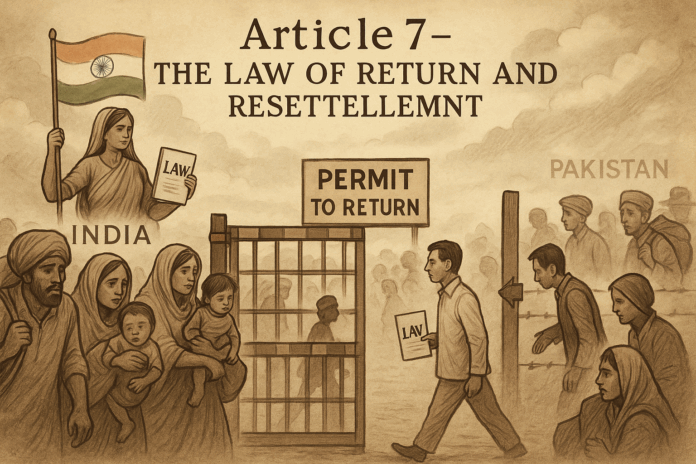Article 7 of the Indian Constitution
What Does Article 7 Say?
Article 7 deals with a very sensitive and historical issue — it talks about the citizenship of people who migrated to Pakistan during the partition of India in 1947.
In simple words:
❝ If a person who was living in India before partition migrated to Pakistan after March 1, 1947, and later came back to India, they cannot be considered an Indian citizen under Article 6, unless they have been resettled and re-registered under Indian law. ❞
Why Was Article 7 Created?
During the partition of India in 1947, millions of people moved across borders between India and Pakistan due to communal violence, fear, and confusion. Some people who moved to Pakistan later returned to India.
But this created a challenge:
Should everyone who comes back automatically become an Indian citizen? Or should there be rules?
To maintain national security and legal clarity, Article 7 was introduced — to differentiate between those who left India permanently and those who returned under proper procedures.
Key Points in Article 7
-
If someone migrated to Pakistan after March 1, 1947, they are not automatically considered an Indian citizen.
-
But if they returned to India under the permit system (a legal way set up by the Indian government for returning migrants), and were registered, they could be granted citizenship.
-
This article overrides Article 6, which otherwise grants citizenship to people of Indian origin migrating to India from Pakistan.
Example 1
Rafiq, a man born in Punjab (India), migrated to Pakistan in June 1947. In 1948, he returned to India without any legal permit and started living in Delhi.
➡ Under Article 7, he is not an Indian citizen unless he went through official channels to re-register.
Example 2
Fatima moved to Pakistan during partition, but returned to India in 1950 with a proper permit from the Indian government.
➡ Since she followed the legal procedure, she may be considered an Indian citizen under the law.
Why Is Article 7 Important?
-
It protects India’s legal system during a time of massive migration.
-
It ensures national security by controlling who could legally return.
-
It differentiates between voluntary migrants and those who may have conflicting loyalties.
Article 7 is not about excluding people — it’s about managing order during chaos. It ensures that the process of migration and resettlement after the partition was done with legal and constitutional clarity, protecting both the nation and the rights of genuine returnees.





